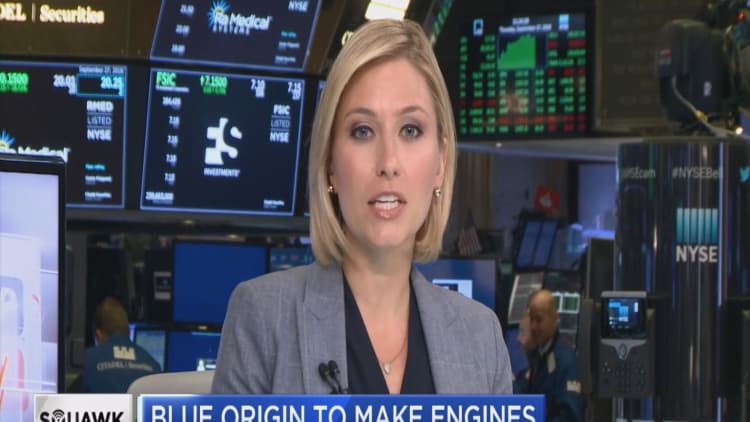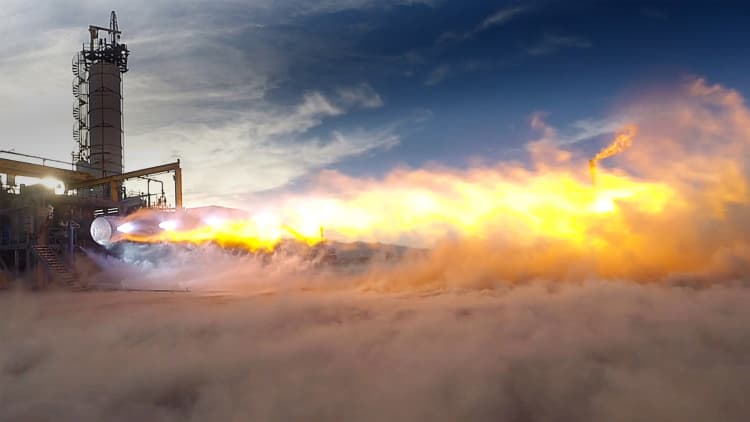
Blue Origin, the space company founded by Jeff Bezos, has won a contract to supply its next-generation engines for the massive rocket United Launch Alliance is developing, a person familiar with the negotiations told CNBC.
The company's BE-4 engine, the thunderous staple of Blue Origin's propulsion business, will power ULA's Vulcan rocket: a new heavy lift vehicle being built to compete with SpaceX for lucrative commercial and military contracts. ULA, a joint venture of Boeing and Lockheed Martin created in 2006, will announce the deal on Thursday, the person said.
ULA confirmed CNBC's reporting in a press release Thursday afternoon.
"We are pleased to enter into this partnership with Blue Origin and look forward to a successful first flight of our next-generation launch vehicle," ULA CEO said in a statement Thursday afternoon.
@JeffBezos: Here's one more shot of BE-4 in its transport cradle.
Bezos is investing heavily in Blue Origin, pouring about $1 billion of his Amazon stock into the rocket venture each year. In a speech Sept. 19, Bezos said he plans to invest another $1 billion next year into the company's New Glenn rocket, which BE-4 will power. The engines of a rocket represent the majority of the cost, so the contract may be worth several billion dollars to Blue Origin. The Wall Street Journal first reported the contract win by the company.
Blue Origin has long been the front-runner in a race against Aerojet Rocketdyne, which has been developing its AR1 engine. While AR1 was still technically in the running until now, Bruno had said he would prefer BE-4 for Vulcan, with AR1 potentially becoming a backup. Aerojet was behind in the development, while Blue Origin had already completed multiple tests, firing the BE-4 engine for long durations.
Aerojet has not completely lost, even if AR1 ends up with no part in Vulcan. ULA announced in May it picked the Aerojet's smaller RL10 engine to power the upper-stage of Vulcan — the part of the rocket that places spacecraft into their intended orbits after a launch. ULA currently uses the RL10 for its Atlas V and Delta IV rockets.
All eyes on the Air Force
The deal also represents a key first step toward Blue Origin winning lucrative military contracts. The Pentagon is working to ensure that all the rockets it buys are built entirely in the U.S., making Blue Origin a potential propulsion supplier for several companies.
Congress has set a deadline of 2022 for phasing out Russian-built rocket engine, which currently power ULA's Atlas V rocket. Vulcan's development began once the Pentagon started pushing to end reliance on Russian engines.
The competition to launch U.S. military equipment is stiff. SpaceX is grabbing more and more share of the market from ULA — which was the sole provider of U.S. military launches for nearly a decade. Northrop Grumman may also get a foothold through its recent acquisition of Orbital ATK. Jefferies said on April 23 that the company's OmegA rocket "is starting at a high level of technology readiness given its leverage of current components."
The next big milestone in the rocket business is an Air Force award expected later this year, with about $1.2 billion up for grabs over the next five years. Known as the Launch Services Agreement, the Air Force is looking to narrow the field of ULA, SpaceX, Northrop Grumman and Blue Origin. Each company won an initial development award in 2016, with the next step to narrow the field to three companies for the development of system prototype.
"We have been working closely with the U.S. Air Force, and our certification plan is in place," Bruno said in his statement.
The military is then anticipated to make a final decision in 2020, picking two suppliers to compete for 28 missions over five years.
Blue Origin becoming a major player
Morgan Stanley told clients earlier this month "to take notice" of Bezos investments in the space industry through Blue Origin, pointing to him as a "force" bringing financial muscle.
"We believe investors may want to pay far more attention to another emerging force for the advancement of efforts in Space that has both the will and, increasingly, the financial muscle to put to work," Morgan Stanley analyst Adam Jonas said in a note.
Morgan Stanley estimated that Bezos' Amazon shares are worth about $160 billion — "equal to around 16 years worth of NASA expenditures on Space exploration," the firm said. Morgan Stanley advised its clients to take note of that comparison as Bezos' wealth continues to grow. Blue Origin has "invested about $1 billion in the Space Coast," Bezos said in his recent speech, with funds going to the company's manufacturing facility and Launch Complex 36, which Blue Origin leased at the Cape Canaveral Air Force Station in Florida.
Blue Origin has spent "over seven years developing this engine to make it reusable," CEO Bob Smith told CNBC on April 18. At the time, Smith said the company was "excited about the commercial opportunities" that BE-4 will provide.
"United Launch Alliance is the premier launch service provider for national security missions, and we're thrilled to be part of their team and that mission," Smith said in a statement Thursday.
Smith has also said before that the engine was "certainly demonstrating all the technical characteristics" that ULA needs for Vulcan – but Blue Origin expects to be able to sell BE-4 to other rocket companies, too.
"We're going to offer it to whoever else will come out and say they need a new engine," Smith said at the time.
Reusability remains the emphasis of Blue Origin, which already has launched and landed its smaller New Shepard rocket multiple times.
Each BE-4 engine is designed to complete "100 full missions," Smith said in April. Reusability provides tremendous cost savings of 50 to 75 percent, Smith said — a claim made more believable by SpaceX's massive Falcon Heavy rocket coming with a price tag of just $150 million, at most.
The first launches of New Glenn and Vulcan are not expected before 2020, the companies have said. Vulcan and New Glenn are expected to compete with Falcon Heavy on cost and power – but SpaceX remains undaunted.
New Glenn will be a monstrous vehicle, standing as high as 313 feet, with seven BE-4 engines powering each rocket. The Vulcan rocket is 191 feet and capable of launching a more than 7 tons of payload into orbit. Falcon Heavy, on other hand, stands 230 feet tall and, after its launch in February, is the world's most powerful rocket since NASA's Saturn V.
The space race is on
After Falcon Heavy launched successfully, SpaceX CEO Elon Musk told reporters he thinks the historic flight will "encourage other companies and countries" to be ambitious in the same way as SpaceX. Musk's company helped the United States reclaim not just a portion but a majority in the global launch market in 2017 and represented more than 60 percent of U.S. launches while doing so.
Bezos has said Blue Origin is "the most important work" he's doing. He also has said there should be "a permanent human settlement on one of the poles of the moon" and thinks it's not just time for humans to return to the moon, it's "time to stay."
While SpaceX may be out to an earlier lead in the development of next-generation rockets, Blue Origin solidified itself as a true competitor with this BE-4 contract — one that may help ULA keep its competitive edge.



